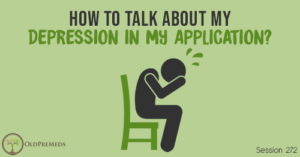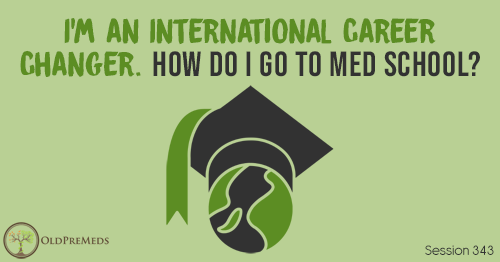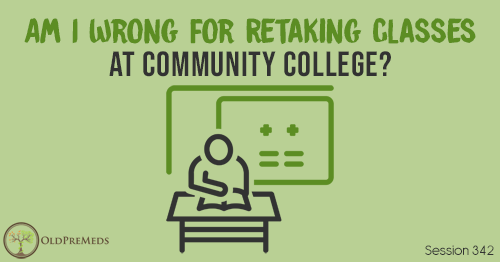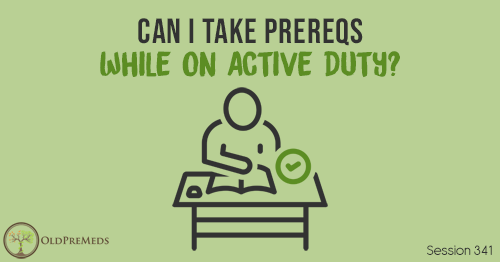Apple Podcasts | Google Podcasts
Session 272
Today, I answer a question regarding a student’s unintended gap years as they battled depression. Should they talk about it in their application or not?
Questions answered here on the podcast are taken directly from the Nontrad Premed Forum over at premedforums.com. Please go ahead and register for an account, ask your question, and have fun with the community.
Also, please be sure to check out all our other podcasts on Meded Media as we try to bring you as many resources as you need on this journey.
Listen to this podcast episode with the player above, or keep reading for the highlights and takeaway points.
[00:57] The MCAT Minute
When do you actually know if you’re ready to take the MCAT? And specifically, when do you know if you still have prereqs to take?
Now, there are two different sets of prereqs – those for medical school, and those for the MCAT.
The MCAT has some tough subjects that you may not have put in your list of classes that you need to take before you apply to medical school. But for the MCAT, there are some classes that are really important.
And so, be sure to dive into what those courses are, and the AAMC has a big list of all of the topics they want you to know. Test prep companies, like Blueprint MCAT, base their content on those. You can self-study but it can be hard. So if you think you’re someone who needs more guidance, I recommend taking Blueprint MCAT’s online course.
So if there are some courses you need to take, make sure you get those under your belt before you tackle the MCAT.
[02:23] OldPreMeds Question of the Week
“Quick overview of my backstory. I graduated premed in 2018 and had a solid MCAT score of 513 as well as a decent GPA of 3.71 with a 3.63 math/science GPA. Long story short, I went through two application cycles and received only one interview which did not go well at all.
I know after receiving counsel that my main issue was my personal statement. I made many other mistakes in my previous applications as well that I now have a much better idea of how to correct. I am currently leaning towards a DIY post-bacc and moving on from there.
My current issue I am facing is how to best address the three unintended gap years I have had since graduating.
Outside my paid full-time job as an EMT, which I have done for 7 years now, I did not do any shadowing, volunteering, or clinical hours of any kind during those three years.
The main reason for this was a temporary lack of motivation. I suffered from serious depression during this gap as I had more free time than I ever had before and began to process my abusive childhood.
I am in a much better place now and ready to get back to my journey to become a physician. However, I am not sure of the best way to approach discussing this period of my life in my personal statement.
I know Dr. Gray often speaks about the importance of telling your story and I think this is a major part of mine, so I believe it should be included. I’m just not certain how to frame it in the right light.
Thank you to anyone who takes the time to read and comment, Jon from Ohio.”
[04:29] The Goal of the Personal Statement
Although I keep on telling students that they need to tell your story, I question whether or not this period actually needs to go into his personal statement. Because Jon says that he was already on this path to begin with. And so, this gap year led to some depression and maybe just allowed him to process his depression.
So the question at the end of the day that I always go back to is – Did this contribute to your reasoning for wanting to be a physician?
And if the gap years are just causing the depression and because you’ve been rejected twice, that is very easy to lead into this depressive state. And processing this abusive childhood on top of that just adds to that depression.
But then again, it sounds like this student was already headed toward becoming a physician. And so, Jon’s depression doesn’t need to be in the personal statement because it’s not a part of why medicine. Otherwise, you could be focusing on the wrong thing here.
Now, you may have processed this and he may have grown from it. And because of that, you want to do psychiatry in the future. A lot of students will be tempted to write it in their personal statement about what they want to do in the future because of their experience.
'The personal statement is about why I want to be a physician, not what do I want to do as a physician.'Click To TweetSo in your personal statement, just focus on why you want to be a physician – and that alone. If depression belongs in there, then it belongs in there. If it doesn’t belong there, then don’t worry about it.
[07:19] Explaining the Gap and Taking a Postbac
The reason you had those gaps is because you didn’t get into medical school. If you got into medical school, there wouldn’t be a gap. And a gap is not an issue that you need to talk about or address in your personal statement.
“It’s super common. It’s not an issue in the personal statement why you have a gap.”Click To TweetThere are a few statements here that don’t make a ton of sense to me. The student has a 3.71 GPA and 3.63 science GPA (biology, chemistry, physics and math.) Those are solid stats. Now, is there a downward trend there that we’re concerned about? Is there an upward trend? Is it pretty flat? The final numbers, as always, don’t tell me the story. But to do a postbac probably isn’t needed.
The student may need to retake the MCAT depending on how old it is. The expiration date of that MCAT unfortunately expires, which is kind of silly, but it is what it is. A postbac though, probably isn’t needed unless the student is struggling with some specific courses.
[08:42] EMT Job is Clinical Experience
And then the student says he didn’t have any clinical experience right after they said he was working full-time as an EMT. That’s clinical experience! And so, you don’t need to do anything more than that because that’s amazing clinical experience.
“Remember, volunteering doesn't equal clinical experience.”Click To TweetVolunteering is just non paid. It could be volunteering at a soup kitchen, a Habitat for Humanity project, and that kind of stuff.
But volunteering doesn’t equal volunteering in a clinical setting. There’s clinical, which is paid or volunteer. And then when we say “volunteer” experience, usually what we’re talking about is soup kitchen kinds of things.
Finally, tell your story. Don’t go too far in depth if you don’t need to. Don’t throw yourself under the bus if you don’t need to, and hope that you get into medical school.
[09:43] A New Resource to Help You!
Finally, The Premed Playbook: Guide to The Medical School Application Process is now available for pre order. So put pre order on Amazon, Barnes and Noble, or wherever you buy books.
It’s all about the application process – from GPA, MCAT, primary application, secondary application, all the way to interviews, what you do if you’re accepted, what you do if you’re rejected, and what do you do if you’re waitlisted. If you preorder it, submit your receipt and I’ll get you a PDF copy of it as well.
Links:
The Premed Playbook: Guide to The Medical School Application Process












